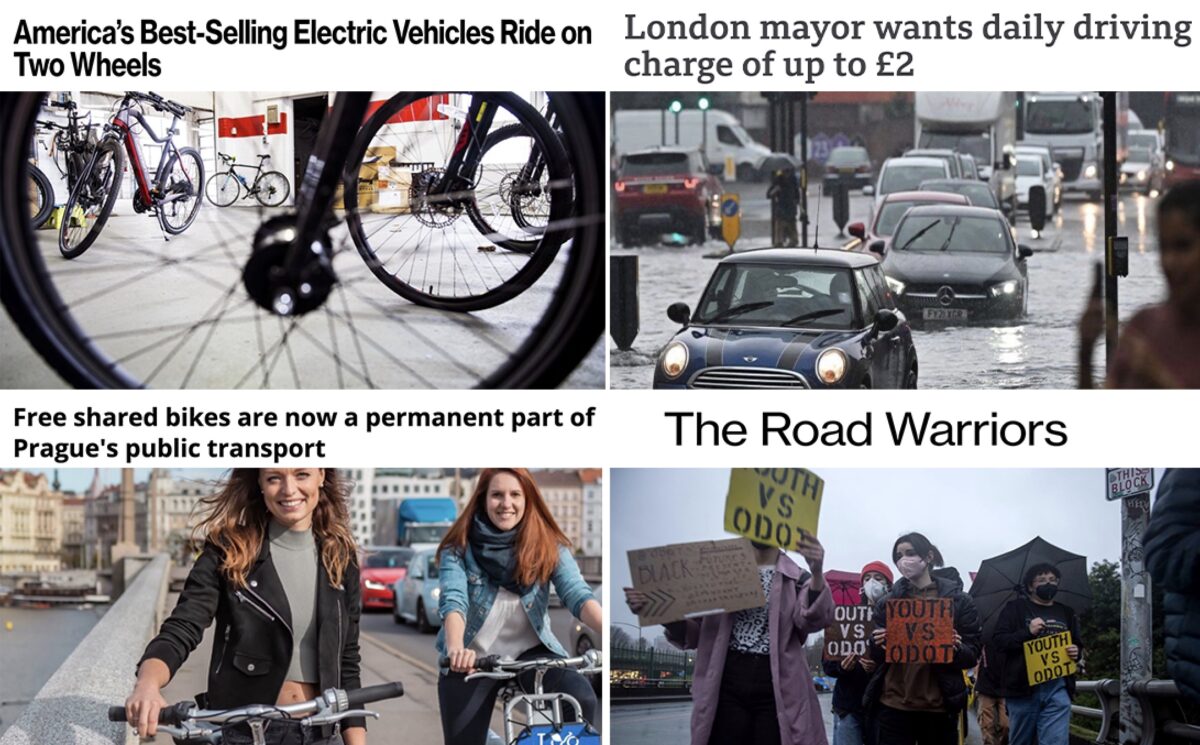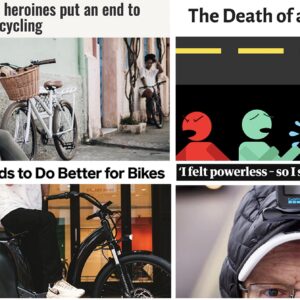Welcome to another wonderful week of news and other fun stuff.
This week’s Monday Roundup is made possible by Action LED Lights, sellers of fine lights from Gloworm, Gemini, and Magicshine.
Here are the most notable items our writers and readers came across in the past seven days…
Urgency in London: The mayor of London is showing the type of bold leadership we need in Portland. He’s going public with a plan for driving fees in order to clean the air and tackle climate change.
Indoor no more: Indoor cycling giant Peloton said a steep drop in demand will lead to a pause in production of its popular indoor bikes.
What Americans really want: With all the attention on EV cars, most people might not realize that EV bikes have vastly outsold their four-wheeled counterparts in the past two years.
Words matter: Great to see national transportation safety leaders doing the right thing by forcing NHTSA to ditch its “94% of crashes are human error” language fallacy from its documents.
Thread of the Week: California land-use and housing activist Matthew Lewis shared an important thread on something I like think of as drivers’ privilege:
Having done my best to piss off a lot of people on this website one thing that stands out is how people who are accustomed to driving their car everywhere have never even really given car culture any thought.
Like, no part of it.
— (((Matthew Lewis))) progressive federalism SOS (@mateosfo) January 19, 2022
Advertisement
Bike-transit magic: We talk a lot about free transit in Portland, but what about trying a program that adds free bike share to a transit pass? That’s what Prague has done with so much success they’ll make it permanent.
Tour de Pizza: I know a lot of you can relate to how fun it would be to ride to all Portland’s great pizza joints by bike, like these University of Chicago students are doing.
R-E-S-P-E-C-T: A former professional bike racer turned advocate, Chris Boardman, has been named the first ever Cycling and Walking Commissioner by the UK government.
Youth v. ODOT goes national: Portland’s youth climate activists continue to garner attention for their anti-freeway stance with this profile in Bloomberg’s CityLab.
Portland priorities: Civic leader Candace Avalos penned an article for The Oregonian with what she feels are the three things Portland needs to get right in 2022.








Thanks for reading.
BikePortland has served this community with independent community journalism since 2005. We rely on subscriptions from readers like you to survive. Your financial support is vital in keeping this valuable resource alive and well.
Please subscribe today to strengthen and expand our work.
Tour de Pizza of Portland? I’m all in.
…Pedal Tour de Pizza, so 2005 Pedal Palooza, 😉
I follow Avalos on Twitter and absolutely don’t agree with her on everything, but that column is pure common sense.
The devil is unfortunately in the details. To demonstrate the importance of charter reform, I voted for her in the 2020 race that she lost to Carmen Rubio, whose office and bureaus are absolutely the worst dead ends at city hall. They don’t even make the time to blow you off. It’s far beyond time to recognize that there just isn’t much overlap between the skills of political leadership and organizational management.
London had been charging a $17 emission fee since 2019.
.jpg)
The local counterpoint to London’s plan to expand the ULEZ is that a Portland “taskforce” punted on a similar congestion fee last year and there was not even a peep of outrage from excessively-online advocates.
On the bike share and transit. It would be amazing to add use of a bikeshare as an option for transfers. There are so many places where transfers, particularly MAX to bus, are not optimal. Being able to jump on a bike right away would save loads of time and add flexibility.
Read Candace Avalos’ piece yesterday. While I agree with her other points about expanding Portland Street Response and greater public oversight of the police, I do not agree with the blanket notion that we need to change the charter; I’d totally support an evidence-based proposal to improve the way Portland’s government works, but I’m not on board with change for the sake of change. Plenty of governments with different structures are as dysfunctional and as broken as ours.
I blame poor leadership and challenging circumstances. There is no guarantee at all that a different structure would produce different results.
But we have poor leadership because of how poorly designed our government is, which goes back to the charter. Five at large seats are bound to produce five mediocre politicians with the broadest political appeal possible. Politicians are usually terrible at running things. The end result is we get people like Tear Gas Ted who wants to play Governor and is able to use his trust fund to fund his campaign while being completely unresponsive to the ‘challenges’ he wanted to take on.
You’d also get more courageous votes when your elected leadership is beholden to your neighborhood instead of the monied interests in the central city. Hardesty is the only city leader that think even mildly represents the interests of the peninsula and I’m pretty sure she lives in like Lents or something. Nobody on the city council cares about N. Portland past N Knowles street and if we had representation we’d at least have one or two folks who remember we exist.
It’s really hard for me to imagine a city that’s even close to our size that is more dysfunctional. I’m not one of those people who think Portland is dying, but our city government is total garbage as an entity. The CoP has a lot of great people who work there but the rot at the top is intense, and that’s something I’ve heard from a lot of current and former CoP employees. The City of Portland, outside of taxation, has almost ceased to exist in most peoples lives. People just do whatever they want because the city is doing nothing.
Perhaps this is so, but if it is, it does not explain why other cities, with similar systems to the proposals being discussed, also have poor leadership that is unable to rise to the moment (San Francisco is top of mind, but there are plenty of examples to choose from).
As I said, I am open to proposals backed up by more than hopeful thinking and a notion that the grass must be greener elsewhere. There will be a real cost to changing the structure of our government, so I think we need to be sure it is worth paying.
All that said, if the proposal is good, I’ll support it and try to get my people behind it.
Is San Francisco doing a bad job? I guess it depends on your metrics. I confess I haven’t been there in a while but my understanding is they have built quite a bit of bike infrastructure, BART is much much much better than TriMet, and they don’t allow massive unsanitary camps to spring up in any green space in the city. Did they do stuff like stop towing abandoned vehicles like Portland did? Do they have rotting zombie vehicles all over the city slowly being parted out or otherwise destroyed? Is every part of the city littered with trash?
To me, Portland is a great example of why consensus decision making is a terrible idea. It’s annoying when its some small non-profit, but when a huge, critical organization like CoP is run via consensus, it equals a total collapse.
I can only judge by what those who live there report. The grass is always greener, right? (If you think things are too rosy in SF, then try Seattle. I’d rank Portland as the least bad of the three in terms of degraded quality of life, but I haven’t conducted a rigorous study of the matter.)
PS Is the city being run by consensus now?
IDK, the folks I know in Seattle seem to like it. It has the same property theft crimes of Portland but better transit and biking.
It sounds like it to me. Consensus decision making is almost always just an attempt by one or a couple of people to get their way while trying to appear democratic in their decision making. It’s why we have our endless “in-motion” plans, neighborhood association meetings, countless committees on x, y and z, etc.
It’s extremely important for leadership at CoP to give the appearance of caring what the community thinks. It’s hard to say how much it actually changes what they do because they are very opaque as an organization. I’m guessing Dan Ryan spends his days with Google Maps open sadly looking for a space to put the safe rest sites where the neighborhood association doesn’t have enough power to veto it. Obviously PPB doesn’t really care what the community thinks but the other agencies do their best to ‘incorporate’ community feedback. PBOT/ODOT regularly warp important conversations around equity, health, and access to justify whatever highway/road project they want to build so they can pretend they have community support. That’s why everything the city does is turns into a caricature of itself. CoP takes the concept of no bad ideas to the next level.
I see no evidence that they do, and I think bureaus like PBOT have given up even the veneer of caring about the community, though maybe they still show up in N Portland. (Not to dump on the entire city; some other bureaus still seem to want to share what they’re up to, and will respond to reasonable feedback.)
Neighborhood associations don’t veto. It’s just not how things work these days, if they ever did. Which they didn’t. Dan Ryan’s problems are his alone.
“It’s really hard for me to imagine a city that’s even close to our size that is more dysfunctional.”
Try Detroit, it’s so dysfunctional that it’s now smaller than Portland. Buffalo and Fresno also come to mind.
Our commission form of government is objectively antiquated. We are the largest city in the US that still uses it, and in total less than 1% of US cities are using it.
There are two big problems with this form of government, especially for a city our size: (1) Commissioners end up spending too much time on executive responsibilities, which cuts into their ability to legislate and interact with their constituents. (2) Commissioners are required to act as chief executives of massive agencies that they are typically unqualified to lead.
A strong mayor or city manager form of government would free commissioners up to legislate and represent their constituents while putting highly qualified professionals in charge of our essential Bureaus. There’s room to argue over some of the other details of charter reform, but eliminating the commission system is a no brainer.
I don’t fully understand this perspective. If Hardesty is spending her time making management decisions for PBOT, she’s doing it wrong. That’s Warner’s job. Her role is to set PBOT’s direction within the legal and budgetary framework approved by the entire council, monitor performance, and otherwise step out of the way.
Would having another manager (or the mayor, either of whom would be stretched thin by overseeing all bureaus) between her and Warner make things better? Is it better for the entire council to have a shallow understanding of all the bureaus than one commissioner “going deep” and focusing on a handful?
These are the questions I want explored. I am not convinced that the proposals I’ve heard will make things better, but I am open to be persuaded. I certainly see flaws in our current system, but the other systems seem to have similar, if less familiar, weaknesses.
These questions are being actively explored. That’s precisely what the Charter Review Commission has been working on. To learn more, these two links are a good starting point:
https://www.portland.gov/sites/default/files/2021/problems-with-our-current-form-of-government.pdf
https://www.portland.gov/omf/charter-review-commission/subcommittees-form-government-city-council-elections
And to be perfectly clear: under our current system, Warner is a political appointee serving at the pleasure of the current commissioner in charge [Hardesty].
The “strong mayor” and “commission + city manager” proposals would not add “another” manager “between [Hardesty] and Warner.” They would eliminate the commissioners’ executive responsibilities entirely, thus allowing them to focus on their roles as legislators, creating separation of powers, streamlining city operations, and clarifying accountability.
The flow of power today is voter -> commissioner -> head of bureau.
With a city manager it would be voter -> commissioner(s) -> city manager -> head of bureau.
With a strong mayor it would be voter -> mayor -> head of bureau.
The city manager model adds another layer. The strong mayor model does not, but we could have that without any change to our charter if Wheeler decided to take control of all the bureaus, as he did when he was first elected.
In addition, Wheeler could probably try something pretty close to the city manager model unilaterally by taking control of all the bureaus and appointing a manager to run them. Technically that manager would still answer to the mayor, but could be made available to oversight from the council as a whole.
Personally, I would prefer us to try before we buy, and encourage Wheeler, or his successor, to govern in a way that emulates the preferred model for a few years, so we can see if it improves outcomes. That would also make transition easier if we liked the results and wanted to enact the changes permanently in the charter.
As I imagine our same leaders working within one of these modified structures, it is difficult to see how Portland would be better off today. That leads me to the idea of that our structure is not the problem, but rather the people we have elected and the political atmosphere we have created.
Related to the Prague pilot program, the County of Hawaii (Hilo & Kailua Kona towns) has a similar ride the Bus and get a Free Bikeshare ride offer, so when you plan your next Hawaii vacation trips you can be carfree on Hawaii island (HIBIke) …and in Honolulu too (Biki of course!). 😉
https://bigislandnow.com/2022/01/05/mass-transit-offers-free-bikeshare-to-hele-on-riders/
E-BIke sales in USA: its really off putting that the Bloomberg Green (Ira Boudway) article glossed over / did not attempt to report the sales of Rad Power cycles, etc…as other articles have mentioned the Rad Power likely sold over 100k units in 2020…so ~10% [to ~20%] of the US market.
“Rad Power Bikes has announced a large funding round that will see $150 million added to the industry-leading electric bicycle company’s coffers. Rad Power Bikes is the largest e-bike company in the US. Sales for 2020 are estimated to have topped 100,000 e-bikes and are growing quickly. Rad Power Bikes is expected to use the new funding to reinvest in maintaining its market dominance through further innovation in new e-bike models as well as by scaling the company’s retail presence and service offerings.” – EBR (Electric Bike Review, 4 Feb 2021)
I would encourage those that want to learn more about charter reform to visit the Charter Review Commission’s website. They have done an excellent job of producing good research while operating with transparency. This is going to be on the ballot in November and it is critical that we as voters get it right.
https://www.portland.gov/omf/charter-review-commission